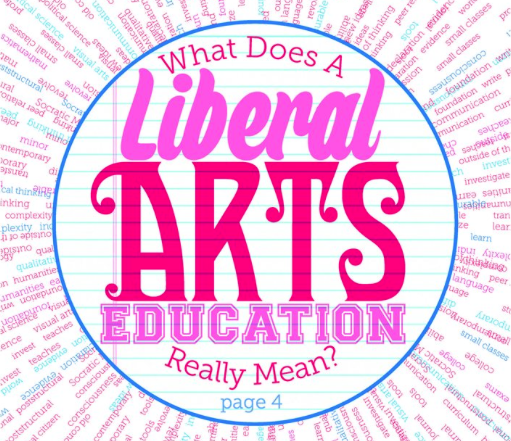We asked a sophomore, junior and senior to share their thoughts on what a liberal arts education means to them.
Sophomore
Since my first year of college began last Fall, there have been many a time when I have engaged in conversations with friends attending public universities, as well as family members, and the subject of course schedules would come up. Peers and adults alike expressed incredulity at classes I have taken, such as Monsters in English Film and Literature, as well as befuddlement at the RCC program and the general education requirements. Why, they asked, did I take Public Policy Analysis when a simpler statistics class could have sufficed? Why did I need to take more French classes when I had already completed two years of the foreign language in high school? What in the world did Ballroom Dancing have to do with anything?
I will admit that, when I filled out my course preference form during that toiling summer before it all began, some of the same questions crossed my mind—but also something else. Anxiety, excitement, and anticipation filled me as the first day of classes approached. I had the desire to put myself out there in the academic world, and I thought that exposing myself to varying disciplines would round out my sharp cultural edges. Appropriately enough, as Fall turned into Spring and I picked out new courses, I felt liberated. Learning becomes a lot more enjoyable when are doing it for your own personal benefit, and not simply for the benefit of a future career. I do not view the general education curriculum or electives as a burden, but rather as an opportunity to broaden my horizons, contributing to bettering myself into the jack of all trades that was much admired in the time of the Renaissance. I believe that students who enroll in a Liberal Arts college are seeking to enlighten themselves—not only about one specific subject, but about the world around us as a whole. The Liberal Arts gives us the pieces, and figuring out what to do with them is what helps us grow as individuals.
In the Liberal Arts, there is significantly lesser segregation. Students are studying what interests them, what they are passionate about. The passion is what unifies them, not financial ambition. If you have ever spoken with a friend about something that she loves and seen the light brighten in her eyes, then you have glimpsed the spirit of the Liberal Arts. That inner light drives us to explore and to take risks, making the most of our brief time in college. As far as one’s interests go, the Liberal Arts is a judgment free zone. One of my classmates is majoring in Chemistry and minoring in Creative Writing, and that is completely alright. Another adores creating cosplays, and has decided to take theatre classes in an attempt to channel that talent. Yet another is a fellow English major of mine, but has quite taken to Anthropology electives. For me, I have taken my required intermediate foreign language classes and transformed them into the foundation for a minor in French. Cases like these occur in abundance throughout the Liberal Arts, and the best thing is that whatever path you choose to take will be the right one for you, and mistakes are simply part of the journey. As corny as it sounds, you will get the most out of your Liberal Arts education here at Rollins if you listen to your heart.
– Alex Mariano
Head Copy Editor
________________________________
Junior
Woe is the English major, forever doomed as a homeless wordsmith, unable to escape their student debt. That is the battle cry of families questioning if they should be spending and borrowing so much to study in seemingly unprofitable, zero success-expectancy fields. Now, this college junior is fighting back with a mantra of her own: our society can benefit from the grounding in ethical thinking and questioning that the liberal arts provide.
Are students who choose to pursue a liberal arts degree any less skilled or desirable in the marketplace? Surely, all successful professions require sensitivity to cultural, demographic, political perspectives, economic and societal differences; a liberal arts education administers this grounding. Most people have six to ten jobs during their careers, and a liberal arts degree provides a great foundation for adapting to new circumstances. Instead of being a one trick pony, liberal arts students are renaissance men and women, who can adjust to new careers and further education. A third of all Fortune 500 CEOs and a slew of success stories from TV personalities to startup founders have liberal arts degrees. For example, Starbucks’ CEO Howard Schultz majored in Communications at Northern Michigan. Stewart Butterfield, the co-founder of Flickr, was a Philosophy major, and Jon Stewart of The Daily Show majored in Psychology before launching his career in television. The proof is in the pudding; a number of liberal arts majors go on to have dazzling careers in a variety of fields, and they are not limited by any means.
With thousands of college students across the country nearing orientation, I reminisce about the incredible liberal arts education I have received, thus far, at Rollins College. While the school has a well-respected pre-engineering program and a superb business school, I chose to study Communication with minors in Art History and Political Science, three subjects that did not make Forbes’ list of the “15 Most Valuable College Majors.” However, my useless major, according to Forbes standards, has landed me three internships before my senior year, so there is a hint of value to it. That said, the classes I have taken—ranging from poetry and public speaking to cultural anthropology and even statistics—have fueled my curiosity, strengthened my writing skills and made me more knowledgeable on a variety of disciplines.
As a competitive culture, hyper-focused on career success, we can lose sight of all the other things that make a person interesting and well-rounded. Hopefully, my words have been enlightening and comforting to the incoming humanities and social sciences undergraduates who have been told that by choosing the liberal arts path, they have chosen a life of perpetual unemployment, staggering debt and more ramen. Placing stereotypes aside, I invite you to pick an area of academic concentration based more on your interests than on what fields are hiring the most people. Because highly successful people, from presidential candidates to Wall Street CEOs, have emerged from the liberal arts tradition, proving that humanities majors are anything but invaluable and that money is not a very good judge of a college major.
– Stephanie Garcia
Web Editor
________________________________
Senior
Three years ago, I was in your exact position: excited, nervous and unaware of the challenges that awaited me. Now, I am 21, entering my senior year, and all of those feelings are still bubbling up. Rollins has certainly changed me for the better, but three years ago I was unaware that these changes would occur as a result of the liberal arts education I have received here.
As a freshman, I was not aware that a liberal arts curriculum is unlike any form of education received at a major university. When I now meet with old friends who chose to attend those schools, I am shockingly aware that our contrasting college paths have shaped us into very different people. I remember being a freshman, hearing that a liberal arts education was intended to “liberate your mind,” and thinking to myself, “Bullshit. I can play the game and get an A and all will be well.” I was so wrong.
To succeed within a liberal arts curriculum, you are expected to think critically and truly analyze the world that surrounds you. While we may not all have the same major or minor, we are all engaging in this mental growth as a collective. So, while I may be majoring in Studio Art, I am still able to engage in critical conversations with peers who are studying Biology or Political Science. The vocabulary might be different, but the critical thought is still the same. Trust me, I have not always believed in the merit behind this form of education. After all, no one is going to employ me based solely on my ability to think critically—which has often left me feeling disillusioned with the value of the liberal arts. You will need to strike a personal balance between real world application and academics. Rollins does offer resources on campus to assist in finding part-time jobs or internships, but producing a working professional is not the primary mission of the liberal arts.
I wish someone had told me three years ago that the journey I was about to begin at Rollins would challenge me. I also wish that someone had warned me that a Rollins education would not guarantee me a career, and that it was up to me to find real world internships and employment opportunities outside of the liberal arts community. Do I regret the past three years of my education? No. Do I know where I am going to end up post-graduation? Hell no. But, despite these uncertainties, I know that my liberal arts education has shaped me into a global citizen, a critical thinker and, ultimately, a life-long learner.
– David Matteson
Editor-in-Chief











Be First to Comment